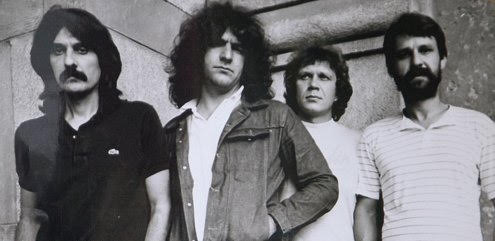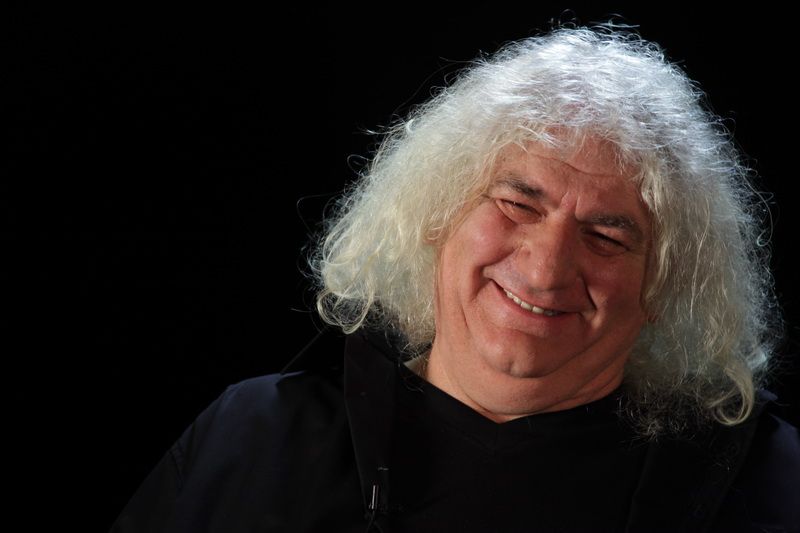Hrvoje Bubić | Intervju s Bruno Langer
Bruno Langer is bass player of Atomsko Sklonište (Atomic Shelter), well know Croatian hard rock from Pula, which he tell us about himself as well the band, famous musicians with whom he collaborated, the band’s legacy as well the future
To start with, please tell us something about your beginnings, what the scene in former Yugoslavia looked like at the time? As far as I know, you had troubles choosing between boxing and music – can you tell us how you chose music in the end?
I was in the same generation of juniors as Mate Parlov, we trained together, in 1965 we were supposed to compete at the Junior Championship of Yugoslavia in Apatin, Vojvodina – M. Parlov as a Light heavyweight, and I as Middleweight. I had to whether I wanted to pursue boxing or rock’n’roll. I had already given up on fighting, and never again went to the trainings, so that I had quit even before the trip, and decided to pursue rock’n’roll. Later on when the boys were jogging on the Monte Zara hill, I would play guitar for them.
Atomsko Sklonište (also known as Atomic Shelter in The UK and The USA), one of the most influential rock acts in this region, evolved from the band Bumerang, which changed its name to Atomsko Sklonište after Sergio Blažić and lyricist Boško Obradović joined the band. Your stage-presence was highly strange: barbed wire, umbrellas, torn-up clothes, Blažević’s act as an alienated man and Obradović’s lyrics about war, psychosis, and the end of civilization. Where did the inspiration for the band-name and stage-props, and if there were any troubles regarding the censorship in the Communist regime during the Belgrade concert in ’91?
Sergio sang, I played bass in Bumerang, but only thanks to Obradović did Atomsko Sklonište come to be. Sergio and I teamed up with Dragan Gužvan, who is one of the best guitarists in the region if you ask me, drummer Saša Dadić, and keyboard-player Eduard Kancelar. Its interesting to note that we all grew up on Monte Paradiso hill, except for Sergio, who lived in another part of town – Rude. Atomsko Sklonište was a multimedial, anti-war project. Obradović called me on the phone and proposed the name Atomsko Sklonište among many others. We hung out with poets, painters, artists. We gained recognition among Slovene photographers for our album artworks. The Slovene artist Kostja Gadnik is responsible for the cover-art of Atomska Trilogija.
As for the censorship during the Communist regime, there weren’t any problems regarding “unacceptable” songs, although we had songs like “Kinematograf Našeg Djetinjstva”, which criticized the state of affairs in the former state, but I would like to single out the song “Mutna Rijeka”, which is based on a true event – the Militia threw a young man down from the second store of the nearby hotel Kontinental. I would also like to point out that the song features guest musician Mel Collins, the saxophone player of my favourite band, King Crimson. It was a true honour to me. When John Etchells brought him in, I was shaking because he was a world-famous musician.
Because our records were sold in Slovenia, which was really liberal, by the RTV record company in Ljubljana (which was like a family to us), we didn’t have as much trouble with censorship and the “Shund-tax”. During the recording-sessions for “U Vremena Horoskopa”, we used the biggest mobile-studio – the one The Rolling Stones and AC/DC used.
As for the ’91 Belgrade concert, it was called the Guitariad in Zaječar. There weren’t actually any problems. The airplane that we took from Belgrade to Ljubljana was actually the last one available from Belgrade, which inspired us to write the song “Posljednji let boing 707”. In Bosnia, right before the war, war would start right the day after we played there, like in Savski Most, Jajce, Bihać – war was right behind us wherever we went.
You have worked with many famous individuals, such as John Etchells, the producer of Queem, while Mel Collins, the saxophone player of King Crimson, was featured as a guest on the album “Mentalna Higijena”. Can you tell us more about that? What was it like to collaborate with such famous names, and is it true that you were the supporting band for Status Quo and Iron Maiden?
It’s true, we were supporting Status Quo, Iron Maiden, as well as Motorhead in ’98 – they even congratulated us after the show. As for Iron Maiden, that was at the concert on the Hypodrome ‘81’s Locomotive, Omega, a bunch of Yugo-bands, and we at the end. Its interesting to note that 10 years after that show, Iron Maiden remembered us and mentioned in one newspaper-article that the “Atomics” were kicking ass.
Concerning Etchell, we often worked with him. We were great friends before the war started because he and John Peel, a famous British radio DJ, were best men at their weddings, and would often play our songs on BBC 1.
What is your opinion about the past and future of rock’n’roll? Has it still got the same importance today as it did before, and does it even have a future as a music genre and philosophy?
I chose rock’n’roll at 15, meaning that I have played for almost 55 years by now. Rock’n’roll is one of the most beautiful experiences of the 20th century, especially the Hippie movement because it has a positive message, which is less talked about, and I’m happy that I was a part of it.
As far as the future is concerned, I’m sorry that young bands don’t have enough opportunities for gigs, while turbo-folk is around every corner. Were it not for biker-gatherings, I think that the rock-scene in Croatia would be dead – kudos to the bikers! I especially feel bad after remembering what a force of nature rock had been during the 80’s.
And for the last question, what are your future plans for Atomsko Sklonište? Will you release a new album, and will we see you in Solin?
It all depends on the whether or not we’re going to see a new Atomsko Sklonište record. We as a band, and me as a bassist, received a prize from Želimir Babogredac because we belonged to Croatia Records for over 25 years. We weren’t in Solin yet, but we were in Split a few times.
PRIJEVOD
Za početak, molim Vas recite mi o svojim počecima, kakva je bila rock scena u tadašnjoj ex-yu, koliko znam Vi ste se dvoumili između boksa i glazbe, možete li mi reći što je prevagnulo k glazbi?
U boksu sam bio u generaciji juniora Mate Parlova, skupa smo trenirali, onda 1965. godine trebao sam otići na natjecanje u Apatin, Vojvodina, juniorsko prvenstvo Jugoslavije, M. Parlov polusrednja a ja srednja kategorija. Trebalo je dati odluku hoću li se baviti rock’n’rollom ili boksom. Već sam „predao sve borbe“ i više nikad nisam kročio na trening, prije puta sam odustao i odlučio sam se za rock’n’roll. Kasnije kad bi dečki imali trening trčanja na brežuljku Monte Zara, svirao bih im gitaru.
Atomsko Sklonište, jedan od najutjecajnih rock sastava na ovim prostorima, nastao je iz sastava Bumerang no dolaskom Sergia Blažića i tekstopisca Boška Obradovića, promjenili ste ime u Atomsko Sklonište.Scenski nastupi su bili dosta neobičajni: bodljikava žica, kišobrani, poderana odjeća te nastup S.Blažića kao otuđenog čovjeka i tekstovi B.Obradovića o ratu,psihozi,kraj civilizacije. Možete li nam reći odakle Vam inspiracija za ime, scenske rekvizite te da li je bilo možda problema što se tiče cenzure u tadašnjem komunističkom sistemu i na koncertu 91’ u Beogradu?
Sergio je pjevao, ja sam svirao bas u Bumeranga,dok zahvaljujući dolasku Obradovića, nastalo je Atomsko Sklonište. Sergio i ja smo se povezali s Draganom Gužvanom koji je po meni jedan od najboljih gitarista na ovim prostorima, bubnjarom Sašom Dadićem i klavijaturistom Eduardom Kancelarom. Zanimljivo je da smo svi skupa odrasli na brežuljku Monte Paradiso izuzev Sergia koji je živio na drugom dijelu grada, Rude. Atomsko Sklonište je nastalo kao multimedijalni antiratni projekt, dok je B. Obradović me nazvao na telefon te uz razne prijedloge za ime banda predložio Atomsko Sklonište. Družili smo se s pjesnicima, slikarima, umjetnicima, dok za fotografije za albume dobivali smo priznanja od slovenskih fotografa, a za omot albuma Atomske Trilogije radio je poznati slovenski umjetnik Kostja Gadnik.
Što se tiče cenzure u ondašnjem sistemu, nije bilo nikakvih problema što se tiče “nepoćudnih” pjesama, premda smo imali pjesme kao što su “Kinematograf našeg djetinstva” koje su govorile o stanju u tadašnjoj državi no volio bih izdvojiti pjesmu “Mutna rijeka” koja je govori o istinitom događaju, o mladiću kojeg je tadašnja milicija bacila s drugog kata iz obližnjeg hotela “Kontinental”. Također bih volio izdvojiti da je na toj pjesmi gostovao Mel Collins, saksofonist mog omiljenog sastava King Crimson, što je za mene velika čast,kojeg je doveo John Etchells,te ja sam ostao totalno šokiran kad je on spomenio M.Collinsa jer on je svjetski glazbenik.
Pošto su naše ploče bile izdavane u Sloveniji koja je jako liberalna preko diskografske kuće RTV Ljubljana (koja nam je bila kao obitelj), nismo imali toliko problema s cenzurom i “porezom na šund”. Tijekom snimanja albuma “U vremena horoskopa” koristili smo najveći mobile studio kakv su koristili Rollings Stonesi i ACDC.
Što se tiče koncerta 91’ u Beogradu, riječ je o gitarijadi u Zaječaru, zapravo nije bilo nikakvih izgreda. Posljednji avion s kojim smo odletjeli iz Beograda za Ljubljanu je zapravo zadnji let iz Beograda što nas je inspiriralo za pjesmu „Posljednji let boeing 707“. U Bosni, u osvit rata, gdje god da bi svirali, sutradan bi izbio sukob kao što je bilo na mjestima kao što su Savski Most, Jajce, Bihać,tako da su nam vihori rata bili za petama.
Surađivali ste s poznatim imenima, kao što su John Etchells, producent rock sastava Queen, dok je na albumu Mentalna Higijena kao gost došao je Mel Collins, saksofonist rock sastava King Crimson. Možete li nam više reći o tome, kako je bilo surađivati s poznatim imenima te da li je istina da ste bili predgrupa Status Que i Iron Maiden?
Istina, bili smo predgrupa Status Que , Iron Maiden kao i Motorheadu 98′ koji nam je čestitao nakon svirke. Što se tiče Iron Maiden, to je bio koncert na Hipodromu 81′ s Locomotive, Omega te s hrpom yugo bandova te na kraju mi. Zanimljivo je to da nakono 10 godina od tog koncerta, Iron Maiden su nas se sjetili te spomenili u jednim novinama napomenivši kako „Atomci“ dobro praše.
Što se tiče J.Etchella, s njim smo često surađivali, bili smo veliki prijatelji prije rata, pošto su on i John Peel,poznati britanski radio DJ bili vjenčani kumovi, često su poštali naše stvari na BBC-u1
Rock’n’roll, danas i jučer, koje je Vaše mišljenje, da li danas ima istu važnost kao nekada, te da li kao glazbeni pravac i filozofija ima budućnost?
Rock“n“roll sam odabrao od svoje 15. godine, dakle sviram ga već 55.godina. Rock“n“roll je predivno iskustvo što se dogodilo 20.stoljeća, pogotovo s hipi pokretom jer ima pozitivnu poruku o kojem se malo govori i drago mi je što sam sudjelovao.
Što se tiče budućnosti, žao mi je što mladi bandovi nemaju priliku za svirku, dok je turbofolk na svakome uglu, a da nije bikerskih susreta, mislim da rock scena u Hrvatskoj nebi ni postojala, stoga veliko hvala bikerima. Žalosti me sve to kad se sjetim kako se rock glazba pratila u 80’ima, kad je bila sila.
Za kraj, koji su Vam budući planovi za Atomsko Sklonište, hoće li izaći novi album te hoćemo li Vas vidjeti u Solinu?
Ovisi o organizatorima, hoćemo li vidjeti novi album. Kao band te ja kao basist dobili smo nagradu od Želimira Babogredca pošto smo pripadali Croatia Recordsu dobrih 25.godina. Dosad nismo bii u Solinu zasad, iako smo bili često u Splitu.







